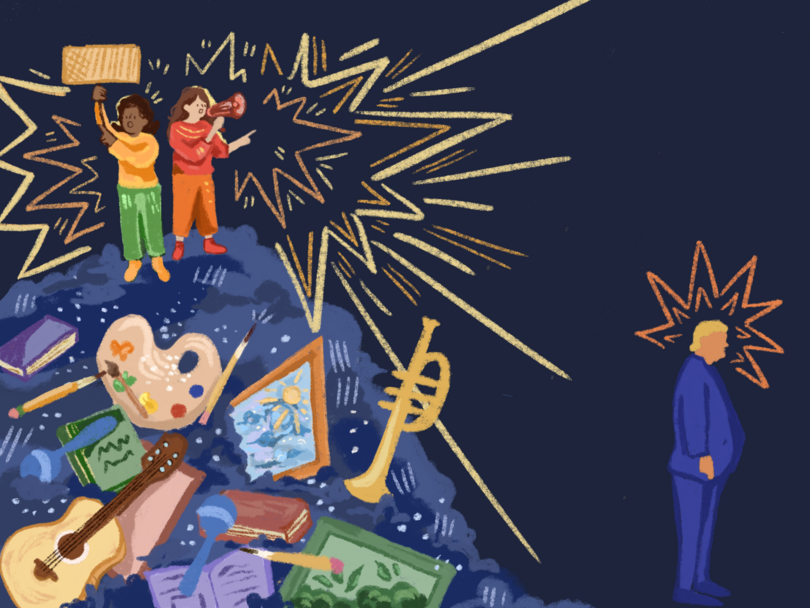Opinion: Valuing social media over real art hurts our chances for revolution

Our columnist says the tendency to value microtrends over art threatens potential for cultural revolution. The nature of expression has become more shallow, and it’s imperative to reinstate impact. Hannah Mesa | Design Editor
Get the latest Syracuse news delivered right to your inbox.
Subscribe to our newsletter here.
So far this month, we’ve witnessed Charli xcx grapple with not headlining Coachella, Katy Perry take a trip to space and Sydney Sweeney’s possible romance with Glen Powell.
Simultaneously, President Donald Trump has made continued efforts to eradicate “woke agendas” across United States institutions, including targeting the Kennedy Center as the new self-appointed chair of its board of directors.
Trump’s attack on the Kennedy Center symbolizes his greater desire to deconstruct and reorganize American art institutions to prevent political dissent through expression.
While the fate of the Kennedy Center does show repression, cultural production in recent decades isn’t exclusive to these institutions. Cultural expression comes from the people, and Americans possess the power to enact creative liberty to fight back against corrupt practices.
Americans tend to conflate real cultural production with microtrends and sensationalized content. This makes waging creative revolution difficult in the digital age.
The internet is a platform with a high propensity for unifying people across the country and world. But in our current era, celebrity drama once exclusive to grocery store checkout lines floods our instantaneous feeds. It replaces those upsetting headlines with flashy pieces of gossip.
And the rise of influencing as a profession has further interrupted the potential for real online advocacy through constant advertisements and links to TikTok Shop.
Many fail to realize the internet is a medium through which culture is distributed — it’s not the culture itself. As we increasingly blur the two, we lose all power to combat corruption through cultural revolution.
Popular culture in the digital age fails to address what it’s historically championed. Throughout history, Americans have engaged in cultural movements with the intention of bettering society, rousing community pride or expressing dissatisfaction with the government.
While some artists have recently broken through the noise of popular culture, they often become stand-alone forces for change, rather than accelerating further progressive movement toward revolution.
Kendrick Lamar’s “Not Like Us” was released as an anthem combating appropriation of the Black community, and Lamar saw massive individual success for the track. But its potential to inspire a greater revolution was sacrificed by the commercialization of the music industry.
The song itself demonstrated the difference between Lamar and other influential artists who neglect to take the same authority over their music, proving how the standard for culture has lowered and genres born with the intention of generating social change have shifted toward indifference.
The cultural products of these other artists may seem revolutionary as a result of virality, but the actual content often holds little long-term effect or the potential for political change.
It isn’t revolutionary, it’s just popular. And it falls victim to the quick turnover of our trend cycle.
When Charli xcx found herself second to headliner Green Day in the 2025 Coachella lineup, fans took to social media to express their complaints. The artist herself wore a sash reading “Miss Should Be Headliner” at her week-one after party.
Charli xcx’s “BRAT summer” felt like a cultural shift in 2024, but the British artist’s album did little to be classified as a catalyst for revolution — rather, the album relied on impressive marketing efforts to achieve its widespread popularity. The aesthetics of BRAT emphasized hedonism, conjuring movements of the past. But its revival of club culture and glamorization of cocaine usage was unaccompanied by any actual social impact.
But Green Day’s steadfast contribution to the wealth of American protest music throughout the 90’s made them a powerful choice for the headline slot. As a significant contributor to the greater punk rock movement, they’ve long provided theme songs for American social change.
Modern music festival culture was once based in the counterculture movement of the 60s, which was inseparable from the Civil Rights Movement and anti-Vietnam war sentiments. Now, they evoke images of celebrities and wealthy influencers dressing up to conveniently turn a blind eye to the social and political issues most Americans are truly facing.
Americans have engaged in cultural movements with the intention of bettering society, rousing community pride or expressing dissatisfaction with the government.Maya Aguirre, Columnist
Artists like Chappell Roan, whose music has resonated with many members of the LGBTQ+ community, are also potential agents for cultural revolution. However, Roan’s declaration in a March 2025 podcast that she’s too busy as a popstar to be politically educated was telling, especially in the wake of Trump’s attacks on trans rights and drag shows as an art form – which Roan takes heavy inspiration from.
Her refusal to engage in political discourse while the community’s rights are increasingly politicized by the Trump administration demonstrates the extent of her privilege. Roan’s silence greatly limits her music’s potential to motivate change.
In the second Trump term, the American people must intentionally engage with the arts to change the social and political landscape. As Trump dismantles cultural institutions and attempts to influence the way Americans see the arts, we must collectively realize culture has always been born of the people and is our most powerful tool in combating repression.
Every cultural movement is a product of the time and environment in which it exists. The most significant and crucial cultural movements stand the test of time because they express the attitudes or frustrations of the people who create them. So relying on popular artists to spur a revolution denounces the role the American people have in creating social change through the arts.
College students are in a privileged position to create works for the betterment of society in this era. We have the privilege of education and the energy to creatively change a landscape we are dissatisfied with.
By assuming a position of passivity we forfeit the opportunity to develop a unique and powerful identity for ourselves as a generation.
Maya Aguirre is a junior digital journalism and history major. Her column appears bi-weekly. She can be reached at msaguirr@syr.edu.






